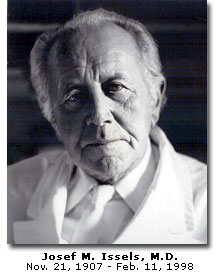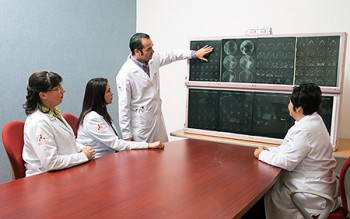
Over the last few years, immunotherapy for cancer has become increasingly embraced by the medical community. But it was more than 20 years ago when our founder, Dr. Josef M. Issels, predicted the future of immunotherapy as an integrative and interdisciplinary approach.
A Groundbreaking Approach to Cancer Treatment
In a practice that spanned more than 40 years, Dr. Issels conducted research involving patients in the end stages of cancer, most of whom had exhausted all traditional methods of treatment. Results led to his pioneering a “holistic concept” of fighting cancer.
While traditional treatments focused on cancer as a disease unto itself, Dr. Issels believed it was a symptom of a larger disease affecting the entire person, body and mind. In such cases, the immune system is unable to perform its usual duties of defending against chronic development of malignant cells.
The breakdown of normal immune system functions centers on T-cells including Natural Killer (NK) Cells, which have the job of detecting and identifying foreign substances that enter the body. Without this normal barrier, malignant cells are free to multiply and form tumors.
Immunotherapy: An Integrative Method
Dr. Issels’ approach went beyond destruction and removal of tumors to address the main underlying causes of malignant cell development and immune system suppression in order to achieve long-term tumor remissions.
Traditional methods such as radiation and chemotherapy merely focus on the cancer cells and tumors. When they become part of an integrative treatment, including non-toxic immunotherapy, they can achieve better results with fewer side effects.
State-of-the-Art Immunotherapy for Cancer at Issels®
Our highly personalized non-toxic immunotherapy programs include Cancer Vaccines, Natural Killer (NK) Cells, Lymphokine-Activated Killer (LAK) Cells and Cytokines.
Contact us today to learn more about why immunotherapy for cancer is one of the hottest topics in modern healthcare.




